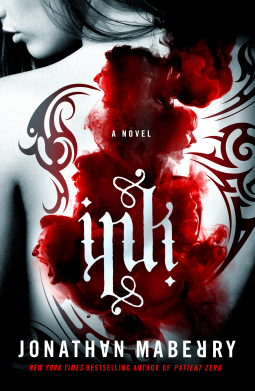Psychic vampires aren't compelling. [Ink by Jonathan Maberry]
Tattoo-artist Patty Cakes has her dead daughter’s face tattooed on the back of her hand. Day by day it begins to fade, taking with it all of Patty’s memories of her daughter. All she’s left with is the certain knowledge she has forgotten her lost child. The awareness of that loss is tearing her apart.
Monk Addison is a private investigator whose skin is covered with the tattooed faces of murder victims. He is a predator who hunts for killers, and the ghosts of all of those dead people haunt his life. Some of those faces have begun to fade, too, destroying the very souls of the dead.
All through the town of Pine Deep people are having their most precious memories stolen. The monster seems to target the lonely, the disenfranchised, the people who need memories to anchor them to this world.
Something is out there. Something cruel and evil is feeding on the memories, erasing them from the hearts and minds of people like Patty and Monk and others.
Ink is the story of a few lonely, damaged people hunting for a memory thief. When all you have are memories, there is no greater horror than forgetting.
Jonathan Maberry's Ink had a very interesting concept - a small time supernatural mystery and memory theft. But the execution could not keep up. Rushed pacing and weird background exposition left me confused as to whether I was reading a new entry in an existing series, which, from what I can tell, is not the case. More than abundant were those tropey male characters who are respectful of women and who absolutely abhor sexual violence of any kind, but who find themselves surround or purposefully surround themselves with broken women who need saving, who need male validation to be their best selves. And so what we have is a story built on the pain of women but centered on a male perspective.
The idea of psychic vampires is something that sounds new and familiar all at once. That egomaniacal character who sees themself as entitled to committing unrestrained violence against other persons, but takes the biggest offense at whiffs of reciprocity. Usually portrayed as the product of maternal neglect, these characters and their histrionics, their hysteria, their, more often than not, sexual perversions rarely make for a compelling villain. Without a compelling villain how does one savor the hero or heroes save of the day? More than 100 chapters and a screwdriver was the deus ex machina? Really?
Character exposition, specifically on secondary mains, was rushed and gratuitous. Two busty bisexual have sex is a detailed scene that was maybe a bit too long. Random cunnilingus scene in the mist of a mini-apocalypse for unneeded romance wasn't fun either. The few minority characters hitting all the stereotypes and embodying most of the intersectionality living in the mostly white town in Pennsylvania was not the easiest sell. Overall the book isn't the worst. But I can't say I enjoyed the weight of the story on my person as it went along. 2 stars from me.
Ink was published November 17, 2020.

Comments
Post a Comment